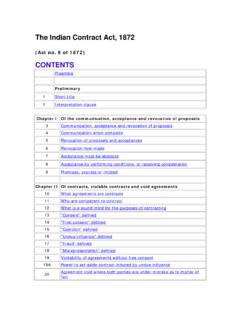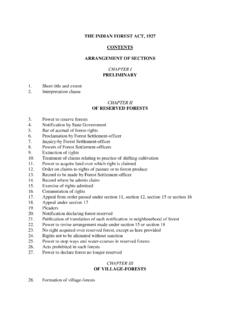Transcription of CONSTRUCTION ON INDIAN RESERVATIONS
1 CONSTRUCTION AND BONDING. ON INDIAN RESERVATIONS : SPECIAL ISSUES AND CONSIDERATIONS. Edward Rubacha JENNINGS, HAUG & CUNNINGHAM. 2800 N. Central Ave., Suite 1800. Phoenix, Arizona 85004. (602) 234-7800. On the Web: CONSTRUCTION ON INDIAN RESERVATIONS : SPECIAL ISSUES AND. CONSIDERATIONS. Edward Rubacha JENNINGS, HAUG & CUNNINGHAM. I. INTRODUCTION. In almost every CONSTRUCTION project, the contractor is faced with a number of questions. Are the plans and specifications sufficient to build the contract as bid? Are there unknown site conditions? Are competent subcontractors available? Does Davis-Bacon apply? Does the owner have adequate funding? What happens if there is a material breach? Each of these questions, and many others, are addressed under a given set of applicable statutes, contract language, and court decisions.
2 The contractor also depends on basic assumptions arising from experience to provide a solid ground on which to make the decision to agree to build a specific project. What the contractor agrees to also affects its surety. A different scenario awaits the contractor and its surety contemplating a CONSTRUCTION project on a reservation . The basic assumptions, such as the ability to get paid, what law applies, what subcontractors and suppliers will be used, and how disputes will be resolved may no longer be true. Contractors and their sureties contemplating projects with Native American tribes and tribal entities must be aware of the special issues and considerations that arise on reservation projects: sovereign immunity;. subordinate tribal entities; cultural differences; and, most importantly, the difficulty, in case of breach, of collecting contract funds.
3 Contractors and their sureties also face the inherent unfamiliarity of tribal court and tribal law, codes, and customs that often are either unpublished or subject to unexpected changes. This paper will identify those special issues and considerations that contractors and their sureties must address before entering into a CONSTRUCTION project on a reservation . Some can be addressed by the use of specific contract language. Others cannot be easily resolved. However, knowing where the trouble may be is the first step in avoiding it. With the information in this paper, the contractor and its surety can ask the right questions and make an informed business decision whether to bid and bond a project on the reservation . II. WHAT ENTITY IS THE CONTRACTING PARTY?
4 Every contractor and surety is familiar with the various forms of business organizations with which it normally contracts: corporations, partnerships and joint ventures, and limited liability companies, to name a few. In turn, the law defines for each of these entities which specific individuals are authorized to execute contracts on behalf of the entity. Further, each entity owns specific but limited, identifiable assets. A different scenario exists on the reservation . Native American tribes, and their subordinate tribal entities, do not follow the established business entity template. Tribes may be organized under different sections of federal law and may form subordinate entities, either corporate or unincorporated, under various federal, state, and tribal laws.
5 The form and function of the subordinate entity may determine whether it enjoys the tribe's sovereign immunity, who can execute the contract on behalf of the entity and any waivers of sovereign immunity, what forum any disputes will be resolved in, whether sales taxes (either state or tribal) apply, and what the contractor can do in case of breach. Therefore, the contractor must identify the specific entity it is contracting with before it bids the project and especially before it signs the contract. A. Recognized Federal Tribal Entities Under federal law, 25 1 et seq. compiles the majority of statutes, acts, and laws relative to Native Americans. To come under this title, a "tribe" must be "federally-recognized." The Secretary of the Interior (the "Secretary") is required to publish a list of the federally recognized tribes in the Federal Register.
6 If a tribe is federally recognized, applicable sections of Title 25 will apply. When construing Title 25 and other federal INDIAN statutes, the applicable canon of CONSTRUCTION is "statutes passed for the benefit of dependent INDIAN tribes .. are to be liberally construed, doubtful expressions being resolved in favor of indians ."1 Indeed, federal preemption of state laws regarding Native American tribes is broader than traditional federal preemption. Two types of tribes and tribal entities can exist under Title 25: "Section 16" and "Section 17." A tribe may vote to be included under Section 16 of the INDIAN Reorganization Act of 1934, 25 461, et seq. (hereafter, "IRA"). A Section 16 tribe is governed by a tribal constitution adopted pursuant to Section 16 and approved by the Secretary.
7 A tribe can also form as a corporate entity under Section 17 of the IRA, 25 477. Under Section 17, the tribal corporation operates under a corporate charter granted by the Secretary. A Section 16 tribe can form a separate corporate entity under Section 17 with powers to contract, to pledge assets, and to be sued. The Section 17 corporate entity is a separate legal entity from the tribe. As noted by the Alaska Supreme Court: Recognition of two legal entities, one with sovereign immunity, the other with the possibility for waiver of that immunity, would enable the tribes to make maximum use of their property. The property of the corporation would be at risk, presumably in an amount necessary to satisfy those with whom the tribe deals in economic spheres.
8 Yet some of the tribal property could be kept in reserve, safe from a judgment execution which could destroy the tribe's livelihood, in recognition of the special status of the INDIAN However, the Section 17 entity may not perform exclusively as the tribe's business arm. Often the Section 16 entity "may have as broad or broader economic powers as its business corporation counterpart acting pursuant to section 17."3. Although Section 17 corporate charters often include a clause that the corporate entity has the power "to sue and be sued," by including such language, the corporate entity may or may not have consented to a blanket waiver of sovereign immunity. Section 17 corporate charters may include a limitation that "the grant or exercise of such power to sue and to be sued shall not be deemed a consent.
9 To the levy of any judgment, lien or attachment upon the property of the tribe other than income or chattels specifically pledged or assigned." In that instance, suit may be allowed against the corporate entity but the judgment creditor may not execute on the judgment. These clauses may or may not determine whether the corporate entity enjoys the protections of sovereign immunity. B. Sovereign Immunity of Tribes and Tribal Entities As a basic premise, Native American tribes, as separate sovereigns, enjoy sovereign immunity and are immune from suit. Native American tribes cannot be sued absent an express and unequivocal waiver of immunity. If a tribe's sovereign immunity is intact, a court lacks the power to hear or decide the litigation. Indeed, at least one tribal court has held that a tribe cannot be sued even in its own tribal court if sovereign immunity has not been Although sovereign immunity is jurisdictional in nature, it operates essentially as a defense to be asserted by the tribe if sued.
10 Tribes and their tribal entities can waive their sovereign immunity but are, for the most part, reluctant to do so. As stated by the United States Supreme Court, the waiver must be "unequivocally expressed and cannot be implied."5 Citing cases dealing with the federal government, some courts have held such waivers must be liberally construed in favor of the tribal entity and restrictively against the claimant. However, numerous courts have upheld contractual waivers of sovereign immunity. Finally, at least one tribal court appears to treat all waivers as If the language of the contract expressly states "The Tribe hereby waives its right of sovereign immunity as to all disputes arising from this agreement," a federal or state court will more than likely find an effective waiver.






